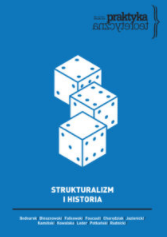Dyskurs jako praxis. Archeologia wiedzy jako teoria materializmu performatywnego
Discourse as praxis. Archeaeology of knowledge wiedzy as a theory of performative materialism
Author(s): Bartłomiej BłesznowskiSubject(s): Structuralism and Post-Structuralism, Psychoanalysis, Social Theory
Published by: Uniwersytet Adama Mickiewicza
Keywords: archaeology of knowledge; discourse; psychoanalysis; subject; materialism; Lacan; Foucault;
Summary/Abstract: The principal theme of the article is the ontological status of Michel Foucault's archaeology of knowledge, with reference to “aporetic” source of its inspiration, which was undoubtedly structuralism and lacanian psychoanalysis. If Foucault's main notion – discourse, is based on the socio-historical permanence of statements related to the same formation rules, discourse formation is the field where the statements are linked and stabilized in their division. The major issue is the materiality of these statements, and consequently the material transformation rules of discourse emergence, the constitutive principle of discontinuity. As Gilles Deleuze wrote: “The present is a roll the dice [...] in one go, bones and rules are rolling”. The discourse is not just a collection of more or less structured rules, but rather a set of practices that perform an act; subjects (individual or collective) therefore do not have a permanent, structured identity within the discourse, but rather represent a constant change and the result of empowerment practices which have their own history. Reproduction of discourse is at the core of Foucault’s method (also after the “archaeological” period), which could lead us to formulate a concept of “extradiscursive politics”.
Journal: Praktyka teoretyczna
- Issue Year: 2016
- Issue No: 22
- Page Range: 45-87
- Page Count: 43
- Language: Polish

